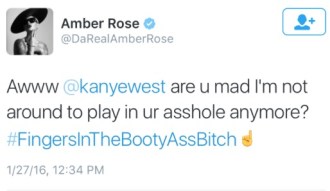by Vianca Masucci

In case you missed it, Amber Rose clapped back with accusations of ass play at Kanye West on Twitter last week, giving birth to the hashtag #FingersInTheBootyAssBitch. She crafted the #clapback in response to Ye’s self-masturbatory twitter rant about Wiz Khalifa in which he, predictably, came for the Cape Verdean cutie with slut shamey comments.
Needless to say, the internet has lost its shit over Amber’s reveal that Kanye has a history of receiving ass play. Tweets, memes, gifs, and status updates about the topic have circulated at such an ass-tronomical rate that even three days later #KanyeAnalPlaylist was still trending. Folks on social media have become obsessed with Amber’s fingers and even more obsessed with Amber herself.
Rose is being held up and celebrated as #clapbackgoals, but we shouldn’t praise her. Not because her tweet is homophobic, as some white bloggers have said to reinforce racist stereotypes of the Black community as homophobic, but the tweet is problematic for other reasons. The tweet is not homophobic in itself; saying that a guy misses ass play is not homophobic!
However, Muva Rose knew that this particular clapback would cut deep because of the homophobic climate of hip hop culture and the U.S. at large. She knew that the response would be overwhelmingly homophobic and humiliating to Ye. We should understand the harm that this situation imposes on QTPoC and be more critical of how these incidences influence stereotypes about sexuality and sexual behavior.
BGD accepts writing and video from queer and trans people of color! SUBMIT your work.
Unfortunately, in our hetero-prescriptive society, particular sexual acts upon certain bodies are equated to, or associated with, queerness. Male ass play is one such ‘subversive’ act that has been linked to homosexuality in popular culture. This is apparent in a question that memes and gifs keep circling back to: “How many fingers does Kanye take?” The call for clarification here is based on a made up scale of ‘gayness’ defined by the number of fingers taken, which is clearly homophobic in nature.
Of course, sexual practices do not define a person’s sexuality. Ass play is fairly common in heterosexual intimacy and is becoming more and more normalized with every verse that Nicki Minaj drops. But at this point, the only artists who have been vocal about getting their booties eaten “like groceries” are women. Rose’s tweet hit a nerve because of this perception of implied homosexuality and femininity.
In other words, Rose’s particular accusation evoked such an extreme reaction—instead of being downplayed as a petty twitter battle—because the effects of this accusation go deeper than harming Ye’s public image.
By portraying Yeezus as the penetrated instead of the penetrator, Muva Rose successfully leveraged the sexual stereotypes forced onto Black men to suggest that Ye is gay, which in Black hip hop culture invalidates his masculinity. By explicitly explaining sexual acts performed on and bringing attention to Ye’s ‘booty’, Muva further succeeded in sexualizing Kanye’s ass, calling to question a part of the body that most typically is highly sexualized in Black culture on women’s bodies. This is meant to feminize him, calling him a #BootyAssBitch for taking sexual pleasures traditionally reserved for women in heterosexual sex.
The reveal that Kanye West, a groundbreaking celebrity who has built a career on his image as a powerful, confrontational, and dominant man, likes receiving ass play could have been a monumental move towards confronting the stigma of ass play. This clapback was the opportune moment for straight cis-men to acknowledge their love of prostate stimulation. It was an opportunity America to join together to talk about lube and flared sex toys. The fact that this reveal didn’t do that speaks to the rigidity of acceptable sexual practices for straight men, especially straight black men. This is of such social significance that Kanye, who has comfortably and openly spoken out against homophobia in hip hop, still felt the need to refute Muva’s claims.
That’s because Kanye West, as a Black man and a rapper, is expected to abide by the very strict rules of “Black masculinity” in mainstream hip hop culture that limits him to certain acceptable stereotypical sexual roles (ie. the playa, the penetrator, the big dick freak– all heterosexual). This is quite unsettling considering the fact that much of the content of mainstream rap is dedicated to sexually explicit material. When these messages are repeated over and over again in rap, they cement these problematic stereotypes and make them harder to defeat. Even an artist as beloved as Frank Ocean struggled to overcome the effects of these stereotypes after he came out.
In fact, these ideas are rooted in the racist ‘sexual threat’ theories devised by European settlers in America as justification for slavery. This notion that Black men are big-dicked penetrators who are primarily lust-driven and sexually insatiable is a racist ideology that settlers used to identify Black men as animals and a sexual threat to white women. This argument was just to justify that Black men needed to be enslaved for the good of society. By affirming these harmful ideas, the twittersphere is feeding the social perceptions of Black men as non-human, as sex-but-not-success oriented, as a danger to white women. These perceptions have extremely negative consequences such as the way officer Darren Wilson described Michael Brown as a superhuman demon and the myths that inform policy makers to believe that higher rates of HIV and STIs in Black men are due to Black homophobia instead of structural racism and white obsession with Black male heterosexuality.
As great as it is to see a misogynist ass-clown like Kanye get his fragile masculinity crushed by a fierce queer icon, it should not come at the price of reinforcing hateful stereotypes and inspiring a bunch of anti-Blackness, homophobia and sex negativity that get national attention. Solidarity must be stronger than #twitterfingers.
 Hailing from Newark, New Jersey, Vianca Masucci is a health advocate working to eliminate health disparities in underserved populations. Her voice is influenced by her experiences navigating this world as a queer, Afro-Latina with a thousand-year-old soul and an insatiable appetite for social justice. Her Meyers-Briggs personality type is IDGAF.
Hailing from Newark, New Jersey, Vianca Masucci is a health advocate working to eliminate health disparities in underserved populations. Her voice is influenced by her experiences navigating this world as a queer, Afro-Latina with a thousand-year-old soul and an insatiable appetite for social justice. Her Meyers-Briggs personality type is IDGAF.
Do not republish anything from this site without expressed written permission from BGD. For more info, go here.
LISTEN TO THE BLACK GIRL DANGEROUS PODCAST WITH MIA MCKENZIE













